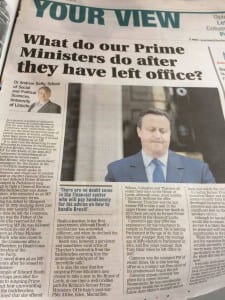 A slightly shorter version of this article was published in The Lincolnshire Echo.
A slightly shorter version of this article was published in The Lincolnshire Echo.
_________________________________
In a period of political upheaval David Cameron’s announcement that he is leaving the House of Commons with ‘immediate effect’ is not the most surprising news of recent months. It would, perhaps, have been more surprising if he had chosen to remain as an MP.
What do retiring Prime Ministers do?
It is now rare for departing Prime Ministers to remain in Parliament. Gordon Brown, who remained as an MP for the whole of the 2010-2015 Parliament is something of an exception in recent years. But Brown, who was a prominent campaigner for the Union in the 2014 Scottish independence referendum, rarely spoke in Parliament and chose not to contest his seat at the 2015 general election. The last defeated Prime Minister who stayed in Parliament long enough to fight a general election from the backbenches was James Callaghan who remained as an MP for two parliamentary terms following his defeat by Margaret Thatcher in 1979, stepping down just before the 1987 general election.
By the time he left the Commons, Callaghan was the Father of the House, the title reserved for the longest serving MP. He was followed in this position by one of his predecessors as Prime Minister, Edward Heath who also chose to remain in the Commons after a defeat by Margaret Thatcher, in Heath’s case for the leadership of the Conservative Party. Heath only stood down as an MP in 2001, twenty-seven years after he ceased to be Prime Minister.
It is the example of Edward Heath which has perhaps provided the starkest lesson to outgoing Prime Ministers about how unrewarding life can be on the backbenches. Thatcher claimed that she offered Heath a position in her first government, although Heath’s recollection was somewhat different, and when he declined the two barely spoke again. Heath was, however, a persistent and sometimes vocal critic of Thatcher’s leadership from the backbenches earning him the unwelcome sobriquet of the ‘incredible sulk’.
It is also the case that few outgoing Prime Ministers now choose to take a seat in the House of Lords, at one time a well-trodden path for Britain’s former Prime Ministers. Of Britain’s post-war Prime Ministers Attlee, Eden, Macmillan, Wilson, Callaghan and Thatcher all ended their days in the House of Lords, although some, most notably Churchill, declined the offer. However, Thatcher was the last former Prime Minister to take a seat in the upper House, and since her death in 2013 there are now no former Prime Ministers in the House of Lords, although a substantial number of peerages have gone to former Ministers from the governments of Major, Blair and even Cameron.
Why has Cameron stepped down?
Cameron’s age may offer one explanation for his reluctance to remain in Parliament. David Cameron is leaving Parliament at the age of 49, that is one year younger than the average age of MPs elected to Parliament in 2015, and five years younger than Tony Blair when he left office in 2007. David Cameron was the youngest Prime Minister of recent times. He is also leaving office at a younger age than most of his predecessors began the job. Churchill, Heath, Callaghan, Thatcher, Brown and of course Theresa May were all older than Cameron is now when they first became Prime Minister.
Cameron almost certainly has plans for a career beyond Westminster. He has considerable personal wealth but is unlikely to follow John Major’s example and sit back and watch the cricket. In reality, former Prime Ministers, including Major and most controversially Tony Blair, have developed lucrative business interests and can demand significant fees on the after-dinner speakers circuit. Although he has said that he would like to remain in public service it is likely that Cameron will be presented with many attractive opportunities in the private sector. While the manner of his departure and his reputation for bold, if not entirely successful, risk-taking may worry some, there are many, particularly in the City of London for whom this may be seen as an asset. Ironically while many voters may criticise Cameron for turning his back on a problem he helped to create, there are no doubt some in the financial sector who will pay handsomely for his advice on how to handle Brexit.
Cameron’s legacy
There has already been a great deal of discussion about Cameron’s legacy since he stepped down as Prime Minister in July. However, it is hard to see him being remembered for anything other than being the Prime Minister who prompted Britain’s withdrawal from the European Union. Whether that is viewed as a toxic legacy or something more positive is, of course, out of his hands. It is dependent on the deal negotiated by Theresa May or quite possibly her successor, and the impact this will have on the UK. Either way it is somewhat ironic that Cameron will largely be remembered for delivering something he didn’t want and has no control over.
One other area in which Cameron deserves some credit is in making the Conservative Party electable once more. The Conservative Party went through three leaders (Hague, Duncan-Smith and Howard) and lost three successive general elections prior to David Cameron’s election as party leader in 2005. Although Cameron was only marginally more electorally successful than his predecessors, failing to win a majority in 2010, he did at least lead the Conservatives back into government, albeit in coalition, after thirteen years of opposition. More extraordinarily, and easily forgotten in light of what has happened since, Cameron managed to secure a Conservative majority in 2015. However, as the last few months have shown, all of that is likely to eclipsed by the impact that Brexit has on a party and a country which he no longer leads.
